|
|
|
Sort Order |
|
|
|
Items / Page
|
|
|
|
|
|
|
| Srl | Item |
| 1 |
ID:
086431
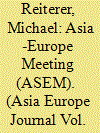

|
|
|
|
|
| Publication |
2009.
|
| Summary/Abstract |
Since its inception in 1996 ASEM has provided an opportunity for focussing relations between the EU and East Asia as a forum for informal multilayered dialogue and building a framework for enhanced cooperation in the political, economic and social/cultural fields. Inter-regionalism, of which ASEM is the incarnation in the EU-Asia relationship, developed into an important policy tool of the EU in an effort to maintain a multipolar setting. Regional identities in Asia are at a different level when comparing South East Asia, North East Asia, East Asia and South and Central Asia. ASEM contributed to a certain extent to the region building in East Asia. Although the economic pillar of ASEM turned out to be the more important one when compared to the political and the people-to-people pillars, it will not become the basis for a (deep) inter-regional free trade agreement because of the diversity of the Asian members, reinforced by the last ASEM enlargement. However, turning weakness into strength, ASEM could become the EU's vehicle for a more holistic approach to Asia thereby fostering a more economic and political multipolar world order. The financial melt down of the international financial order lead to the rediscovery of the need for international cooperation not only on the level of business but also among states. Making use of ASEM, developed over the last 12 years, could provide the much needed platform in the EU-Asia relationship.
|
|
|
|
|
|
|
|
|
|
|
|
|
|
|
|
| 2 |
ID:
086422
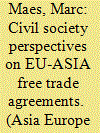

|
|
|
|
|
| Publication |
2009.
|
| Summary/Abstract |
This paper focuses on the positions taken by civil society organisations that actively campaign on trade policies. Trade campaigners oppose the neo-liberal approach to trade and development and advocate a much more gradual and prudent approach to trade liberalisation. They stress that trade liberalisation will only lead to sustainable development if it respects environmental and social concerns, including the gender dimension of trade; if trade liberalisation is properly owned, prepared and sequenced; adapted to the institutional and economic needs and capacities of the countries and people involved, and accompanied by all necessary flanking measures. Trade campaigners stress the need to maintain policy space and the necessary governance instruments to react to changing circumstances and address social and environmental concerns. They denounce the lack of information, consultation and participation provided by governments in trade policy formulation and negotiations and they campaign to raise awareness and create more room for debate and participation.
This article builds on a paper presented on 19-20 June 2008 at an UNU-CRIS Work Shop in Bruges on "Deep Integration and North-South Free Trade Agreements. EU Strategy for a Global Economy".
|
|
|
|
|
|
|
|
|
|
|
|
|
|
|
|
| 3 |
ID:
086418


|
|
|
|
|
| Publication |
2009.
|
| Summary/Abstract |
The EU sets considerable store by the need for its Free Trade Agreements (FTAs) now under negotiation with Asian countries to contain a sustainable development chapter with clear references to respect for the core ILO labour standards. While they reject the sanctions-based approach demanded by the European trade unions, they accept that some real enforcement mechanisms will be needed. Among Asian countries, Korea is most likely to accept some form of a social clause, while India and certainly some ASEAN countries strongly oppose it. This article explores the prospects for mutual agreement on this thorny issue at the bilateral level which, to date, has failed at the multilateral level.
|
|
|
|
|
|
|
|
|
|
|
|
|
|
|
|
| 4 |
ID:
086406
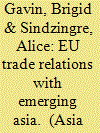

|
|
|
|
|
| Publication |
2009.
|
| Summary/Abstract |
Trade interdependence between Europe and Asia has rapidly increased in recent years. Europe-Asia trade flows now constitute a 'third link' in the global economy. As trade expands, however, global trade governance has declined and free trade agreements (FTAs) have increased. Hence, the Global Europe strategy has been designed to enhance trade relations with emerging Asia which is the most dynamic region in the global economy today. But Asia's model of export led growth leaves it more exposed to shocks emanating from outside the region than ever before raising questions about its sustainability. Deep integration agreements between Europe and Asia are needed to foster economic growth. They also need a development dimension to help Asian countries address their key development challenges.
Brigid Gavin was the Research Coordinator of the workshop on 'Deep Integration and North-South Free Trade Agreements: EU Strategy for a Global Economy' which provided the papers and discussion forum for the articles in this special edition. The workshop took place at the United Nations University-Comparative Regional Integration Studies (UNU-CRIS) centre in Bruges, Belgium on 19-20 June, 2008. She wishes to express her thanks to Mr Luk Van Langenhove, Director of UNU-CRIS for financial support and to all the authors and participants in the workshop for their contribution to making this project a real success. A special word of thanks goes to Lars Nilsson, Chief Economist Unit, DG Trade, European Commission for his opening presentation to the workshop.
Alice Sindzingre is Research Fellow, National Centre for Scientific Research (CNRS), University of Paris and Visiting Lecturer at School of Oriental and African Studies (SOAS), University of London. This analysis draws from her paper 'The EU Economic Partnership Agreements with Africa' which she presented at the workshop and available on the UNU-CRIS website.
|
|
|
|
|
|
|
|
|
|
|
|
|
|
|
|
| 5 |
ID:
086407
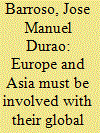

|
|
|
|
|
| Publication |
2009.
|
| Summary/Abstract |
I wish to welcome the new members of ASEM. With the summit in Beijing of 24 October 2008 Europe is able to engage virtually the whole of Asia through ASEM. This is cause for celebration, and it means that we will be even better placed to advance our shared policy goals in the international arena.
|
|
|
|
|
|
|
|
|
|
|
|
|
|
|
|
| 6 |
ID:
086429
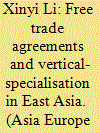

|
|
|
|
|
| Publication |
2009.
|
| Summary/Abstract |
Regional integration in East Asia has been described as 'market-led' integration driven by the activities of multinational corporations creating vertical specialisation. This paper investigates the effect of free trade agreements (FTAs) on vertical specialisation-based trade by employing a gravity estimation for a sample of nine East Asian countries plus the US. We find that FTAs promote international trade based on vertical specialisation and enhances deep integration between countries. The FTA effect on vertical specialisation-based trade increases with pre-agreement vertical linkage level, that is, the deeper the real integration between countries the larger the FTA impact. The results of this paper also suggest that deeper economic integrations, such as currency unions, will enhance trade based on vertical production by reducing the risk of exchange rate volatility.
|
|
|
|
|
|
|
|
|
|
|
|
|
|
|
|
| 7 |
ID:
086424


|
|
|
|
|
| Publication |
2009.
|
| Summary/Abstract |
The central framework of Asian integration is ASEAN+3 and, since its first Summit meeting in 1997, it has advanced regional integration in East Asia. Based on the direct experience of the author, this article presents a critical assessment of the progress made over the past ten years and argues that the 'Singapore Declaration' of 2007 is not ambitious enough for the future. An East Asian customs union (EACU) and common regional market should be the next targets for trade integration. In terms of monetary integration, Asia should aim for de-dollarisation and to achieve this it is crucially important to create a regional Asian monetary system (AMS).
|
|
|
|
|
|
|
|
|
|
|
|
|
|
|
|
| 8 |
ID:
086415


|
|
|
|
|
| Publication |
2009.
|
| Summary/Abstract |
Since April 2007, the EU Commission has been entrusted to start negotiating a FTA with ASEAN countries. Being enshrined in the logic contained in its 'Global Europe strategy', the proposed EU-ASEAN FTA finds its economic rationale in the expected overall positive impact found by most econometric studies on the topic. This article argues that although beneficial, these studies are limited conceptually and methodologically. In particular, they are unable to tackle the issue of differentiated effects on several groups of stakeholders. By analysing, through a questionnaire, the opinion of a number of ASEAN stakeholders, this article brings complementary information on the perception of the planned EU-ASEAN FTA by these different stakeholders. Whilst offering many opportunities, the FTA presents also a number of risks, the most critical one being the costs of adjustment, particularly for poorer ASEAN member countries.
|
|
|
|
|
|
|
|
|
|
|
|
|
|
|
|
| 9 |
ID:
086430
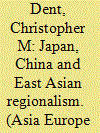

|
|
|
|
|
| Publication |
2009.
|
| Summary/Abstract |
East Asia is becoming an increasingly coherent regional entity in political economic terms, and remains a region of enormous geo-strategic significance for the European Union. Europe's links with China and Japan are especially important, and moreover these two countries are looking in various ways to exercise various forms of regional leadership in East Asia. This has critical implications for the EU's relations with the East Asia region generally, and also for the wider international system. Similar and related impacts maybe construed from deepening East Asian regionalism, involving processes where both Japan and China play vitally important roles. The analysis presented here examines the both micro and macro level developments in East Asian regionalism, and issues relating to Japan, China and regional leadership. It concludes by discusses the implications of these matters for the European Union, and recommends that the EU should pay particularly close attention to emergent exercises of regional leadership in East Asia, most likely to be performed by Japan and/or China.
|
|
|
|
|
|
|
|
|
|
|
|
|
|
|
|
| 10 |
ID:
086410


|
|
|
|
|
| Publication |
2009.
|
| Summary/Abstract |
A number of countries have chosen recently to shift away from an exclusive support to trade multilateralism and towards regional or bilateral trade agreements. Being no exceptions in this respect, the Republic of South Korea and the European Union have engaged in a bilateral FTA negotiation in early 2007. The objective of the paper is to account for the unexpected difficulties encountered in the negotiation. The paper starts with a brief overview of the trade and investment relations between the two partners and underlines the complementarity between the two partners, as well as their respective offensive and defensive interests. As a next step, the paper delves into the "politics" of the FTA negotiation with a view to highlighting the motivations and objectives of the various partners involved. It comes to the conclusion that the major reason why the negotiation turned out to be more complex than initially expected relates to the two partners' diverging views as to what a discriminatory FTA should imply.
The present research has
|
|
|
|
|
|
|
|
|
|
|
|
|
|
|
|
| 11 |
ID:
086427


|
|
|
|
|
| Publication |
2009.
|
| Summary/Abstract |
Over the past decade, a number of countries in the Asia Pacific region have concluded a new generation of FTAs that liberalise trade in goods and services while also containing investment protection provisions. This paper provides an overview of the recent trends giving special attention to the impact of Investor State Dispute Settlement (ISDS) cases which has influenced the evolution of investment rule-making over the last decade. The paper asserts that investment disputes have influenced the refinement of the provisions of the new generation of investment agreements as well as the inclusion of a series of procedural and substantive innovations in these agreements.
*Ambassador of Costa Rica to the European Union, Belgium and Luxembourg. This paper was written on the basis of several research projects in which the author participated, before assuming the current position with the Costa Rican government, as consultant with UNCTAD. However, the opinions and views expressed in this paper do not represent the position of UNCTAD, nor the Government of Costa Rica and fully fall under responsibility of the author.
|
|
|
|
|
|
|
|
|
|
|
|
|
|
|
|
| 12 |
ID:
086414
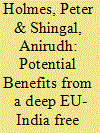

|
|
|
|
|
| Publication |
2009.
|
| Summary/Abstract |
Both parties to an eventual EU India FTA have agreed that it should not merely address tariff barriers but should also go further into what is known as deep integration, originally developed in the 1990s by R.Z. Lawrence. This relates to the removal of all obstacles to cross border business whether actual trade barriers or domestic regulations. We distinguish deep institutional integration from the deep integration of markets. We ask the question how one may support the other. There are potential market failures that can be addressed by trans-national rules on standards and technical regulations and services, but we conclude that the biggest impact of a deep RTA would be on the domestic economy of India if it provides an opportunity for reform. It should be noted that the paper draws on a study undertaken by the authors for DG Trade, but it represents only the views of the authors.
|
|
|
|
|
|
|
|
|
|
|
|
|
|
|
|
|
|
|
|
|